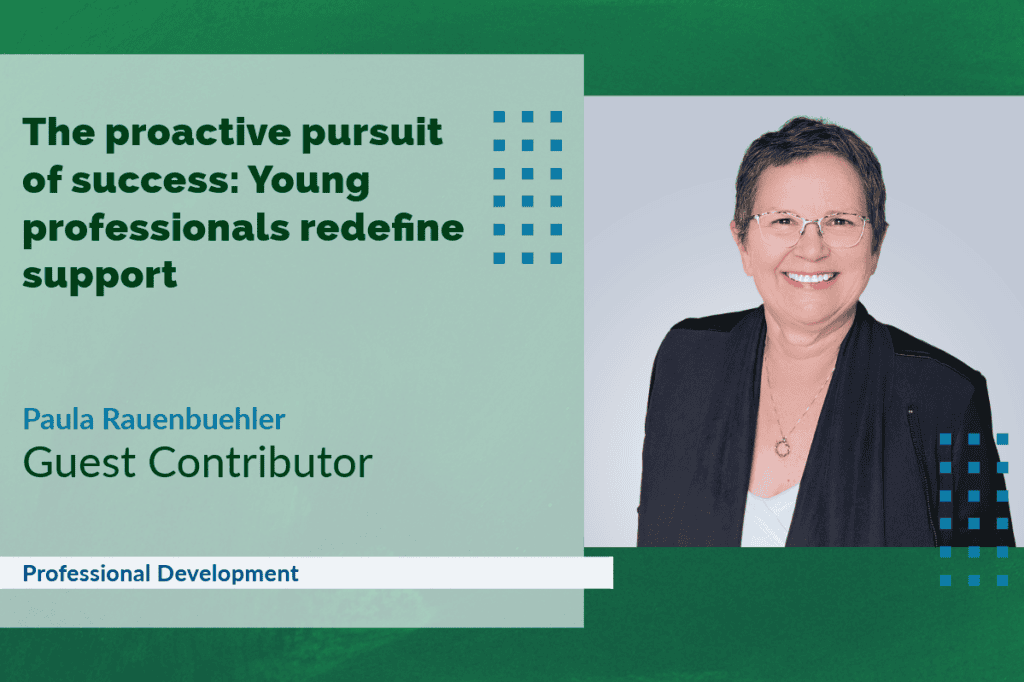
February 24, 2025
It’s not unusual to hear that Millennials and Gen Zers do things differently.
Twenty- and 30-something individuals are seeking out a variety of support.
It’s more than having a traditional finance advisor to help plan for retirement.
It goes beyond seeking personal trainers to train for a marathon or address significant health challenges.
A new generation of leaders – Millennials and Gen Zers – are rewriting the rulebook, proactively seeking support and guidance before it’s a necessity, driven by a desire for holistic well-being and a fulfilling life.
They’re not waiting for a crisis to address their finances, health or career – they’re building a comprehensive support system to thrive in all areas of their lives as key to long-term success and happiness.
This proactive approach represents a shift in how young professionals view success.
It’s no longer just about climbing the corporate ladder – it’s about achieving a balanced and fulfilling life, where personal well-being is just as important as professional achievement.
This means investing in themselves early and often, recognizing that support and guidance are valuable assets.
They understand that building a strong foundation in all aspects – financial, physical, mental and social – allows them to navigate challenges with resilience and confidence.
The proactive support system: A holistic approach
Young professionals are constructing a multi-faceted support network that goes beyond the traditional mentor or manager.
This network is designed to provide personalized guidance and support across all areas of their lives, enabling them to proactively address potential challenges and maximize their potential.
This approach recognizes the interconnectedness of different aspects of well-being.
Central to this is understanding the distinct roles of various support figures, from advisors and mentors to coaches and trainers.
Financial advisors
While retirement planning is still on the radar, the focus is broader and more immediate.
Young professionals are seeking guidance on managing student debt, navigating the gig economy and making informed financial decisions now.
They’re building a solid financial understanding from the start.
This might involve working with financial advisors but also leveraging budgeting apps, online resources and peer communities to develop strong financial literacy and habits.
Career coaches and mentors
Beyond formal mentorship programs, young professionals seek personalized career coaching. They want help identifying their strengths, developing essential skills and navigating career transitions.
They understand that career development is an ongoing process, and they’re actively seeking guidance to stay ahead of the curve and achieve their professional goals.
This might involve working with career coaches to refine their goals and tap into their natural characteristics to achieve those goals or seeking mentors who can offer advice.
A career coach helps individuals define career goals, develop strategies to achieve those goals and improve specific skills.
They focus on action planning and accountability.
A mentor, on the other hand, is typically someone who’s walked the path the young leader is on and who provides guidance and support and shares their wisdom based on their own experiences.
Wellness advocates
The emphasis on mental and physical well-being is paramount.
Young professionals are prioritizing work-life balance and seeking support for stress management, mindfulness and overall wellness.
This often includes:
Fitness and nutrition coaches
Many young professionals are actively investing in their physical health, recognizing the connection between well-being and performance.
They understand that physical health is the foundation for both professional and personal success.
A personal trainer focuses on helping individuals achieve specific fitness goals through training programs.
They provide instruction, motivation and accountability.
A nutrition coach helps individuals develop healthy eating habits and create personalized meal plans to support their health goals.
Sleep specialists
Recognizing the crucial role of sleep in both physical and mental health, some are seeking guidance from sleep specialists to improve their sleep hygiene and overall rest.
They understand that quality sleep is essential for cognitive function, emotional regulation and overall well-being.
Mental health professionals
Seeking therapy and counseling is becoming increasingly destigmatized and young professionals are proactively prioritizing their mental health, not just in times of crisis but as a preventative measure.
They understand that mental well-being is just as important as physical health, and they’re seeking support to manage stress, build resilience and maintain a positive mindset.
Peer networks
Connecting with like-minded individuals is crucial.
Peer networks provide a sense of community, shared experiences and mutual support.
These networks can offer advice, encouragement and a sense of belonging in a fast-paced and often isolating professional landscape.
These networks can also provide valuable insights into industry trends, career opportunities and best practices.
Skill development resources
Continuous learning is a priority.
Young professionals are actively seeking opportunities to upskill and reskill, whether through online courses, workshops or professional certifications.
They want access to resources that will keep them relevant and competitive in the job market.
They understand that the job market is constantly evolving, and they’re committed to staying ahead of the curve by continuously developing their skills and knowledge.
What this means for businesses: A call to action
To attract and retain the best employees, businesses must adapt and offer a more holistic approach to employee support.
This is not just about offering competitive salaries and benefits – it’s about creating a workplace culture that values and supports the overall well-being of its employees.
This requires a fundamental shift in mindset, recognizing that employees are not just workers, but whole people with complex needs.
Here are a few ways businesses can respond:
- Expand benefits packages – Consider benefits that go beyond traditional offerings. Include financial wellness programs, access to career coaching, mental health resources, subsidies for continuing education, stipends for fitness programs or wellness apps. Identify what benefits are included but unused from your current providers.
- Foster a culture of support – Create a workplace where employees feel comfortable seeking guidance and support. Encourage mentorship programs, peer networking opportunities and open communication with managers. Normalize discussions about mental health, work/life balance and the challenges of doing “all the things.”
- Invest in employee development – Provide access to training and development programs that align with the needs of young professionals. Offer opportunities for coaching, skill-building, leadership development and career advancement, as well as workshops on topics like financial literacy, stress management and work/life integration.
- Promote work-life balance – Recognize the importance of well-being and create a culture that truly supports work-life integration. When appropriate, consider flexible work arrangements, encourage use of vacation time and be supportive of employees prioritizing their mental and physical health. Lead by example – managers should model healthy boundaries and prioritize their own well-being.
- Embrace technology – Leverage technology to connect your team with the resources and support they need. Utilize online platforms for skill development, peer networking and access to wellness resources.
By understanding and addressing the multifaceted support needs of young professionals – including their proactive approach to well-being and their desire for guidance on all aspects of life – businesses can create a thriving and engaged workforce.
It’s not just about offering a job – it’s about providing a platform for growth, well-being and a fulfilling career journey.
Businesses that embrace this holistic approach will be the ones that attract and retain the top talent of the future.
 A new standard in electric refuse and recycling collection
A new standard in electric refuse and recycling collection ENT & Allergy Associates opening new clinic in Stevens Point
ENT & Allergy Associates opening new clinic in Stevens Point







